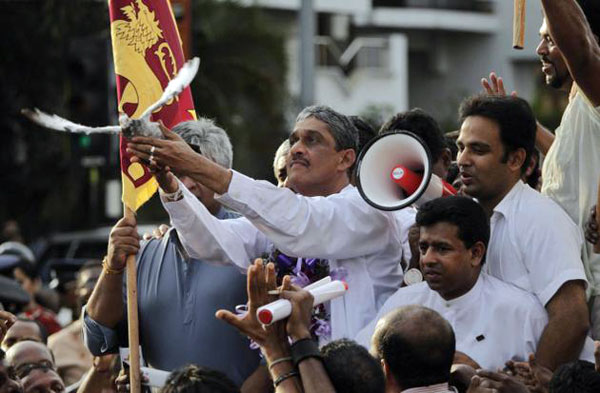Reply To:
Name - Reply Comment
 By Vijitha Herath
By Vijitha Herath
Former Commander of the Army Gen. Sarath Fonseka who was imprisoned for more than two years has been released. It is through powers vested with the President to pardon convicted offenders as stipulated in clause 34 in the Constitution. It is how this freedom could be legally defined. However, Gen. Fonseka’s freedom is a result of a relentless struggle carried out by the masses against the arbitrary act of imprisoning him for coming forward to challenge President Rajapaksa at the last presidential election. Mahanayakas of all Chapters, religious leaders of all religions, intellectuals, artistes, political parties, mass and civil organizations as well as the ordinary folks are the share holders of his freedom. However, Gen. Fonseka’s release doesn’t terminate this struggle.
Gen. Fonseka came forward as the common candidate at the presidential election as a reflection of the standpoint that had developed in the country that the menace of executive presidency should be abolished. However, due to the ‘sin’ of challenging the Rajapaksa regime he was forced to be a political prisoner sending a message to many others. The limitations of his pardon are not clear though he deserves a complete pardon without any conditions. All legal action taken against him due to political reasons should be withdrawn. Even those who were accused of murder and crime had the ‘luck’ of their cases being withdrawn due to their political stooging. As such, it would not be a difficult task for the government to withdraw cases that were manipulated due to ‘royal wrath.’
It is no secret that the government, in its use of the media, is attempting to fulfil two objectives through the release of Gen. Fonseka. The first is to suppress, at least for a short period, the enormous anti-government feeling that has developed in the country due to the huge increase in prices of goods and services, for burdening the masses with taxes that are levied mainly to meet losses from frauds, corruption and wasteful spending by government ministers and their lackeys and also due to the revelation of connections of government politicians in treasure hunting, raping of women and children and in drug rackets. The second is the attempt to cover up the nakedness of democracy-a democracy that is being deteriorated due to attacks on media institutions and journalists, violation of human rights and the spread of terror through the ‘white van’ culture.
President Rajapaksa and the government through this act might gain a short respite by attempting to divert mass attention away. However, President Rajapaksa would not gain anything from the democratic point of view by releasing Gen. Fonseka for, no citizen would ever consider honourable the act by the President to drag the person who challenged him at the presidential election before a court martial he appointed, sentence him on fictitious charges for which he placed his signature and then after two years to pardon him due to local and international pressure.

On the other hand, in a situation when those who are pasting posters too are attacked and assaulted by groups arriving in ‘white vans’, when hundreds of political prisoners are languishing in known and unknown detention camps in the North, when masses in the North have to live under a semi-military administration, the government cannot parade a different image merely by releasing Gen. Fonseka. It should not be forgotten that there are a large number of people who lost their employment, who were imprisoned and also had to leave the country due to political victimization as a result of supporting Gen. Fonseka. The government is unable to realize the importance of real mediation on the ground than its international bragging carried out on peace and reconciliation spending billions for logistic companies such as Bell Pottinger Group, a British multinational public relations and marketing company.